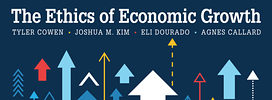I want to make sure that I understand what we are debating.
We are arguing with Tyler’s assertion that sustainable long-term economic growth should be elevated over all other priorities.
Right?
Some reasons to put sustainable economic growth at the center of our moral philosophy, and the policy decisions that align with this view, include the following:
-
Progress, as measured by improvements in health outcomes, living standards, educational attainment, leisure, and other quality of life measures is tightly correlated with societal wealth growth. The wealthier a country is, all things equal, the better off the average citizen will be.
-
That progress is ultimately underpinned by economic growth, and not on the enactment of political policies that prioritize redistribution or some other goal related to social justice.
-
That the prioritization of long-term sustainable economic growth is the best way that we can invest in the well-being of future generations, as they will be the beneficiary (or the victim) of the choices that we make today.
-
That even small changes in the rate of economic growth can have enormous long-run impacts, and that the benefits to future generations of even small growth-positive choices should have a starring role in our moral philosophy.
If economic growth is to be prioritized, then we must accept trade offs. These trade offs include:
-
Greater levels of income inequality and wealth concentration.
-
Reduced public support for the elderly in favor of greater investments in kids.
What are the other tradeoffs if we follow Tyler’s heuristic of prioritizing long-term sustainable economic growth?
What I want is for Tyler’s big idea to convince me to change my mind.
I want to be persuaded that at least one of my traditional moderate-to-liberal views on most issues is wrong.
Wrong in the sense that my grandkids, and the grandkids of Tyler, Agnes, and Eli, will be worse off.
Maybe if I’m wrong about one thing, my whole ideological orientation toward economic and policy issues (moderate-liberal) will finally become unstuck. And if I can be convinced, maybe others will be as well.
Tyler writes that I should Google his opinions. But what I want to understand is how this big idea—prioritizing sustainable economic growth—plays out when applied to real choices.
Is it impolite, or somehow internet uncool, to ask that we get concrete?
It would be wonderful if spending time with Tyler and Agnes and Eli resulted in having my mind changed.
Is this what we are debating?

